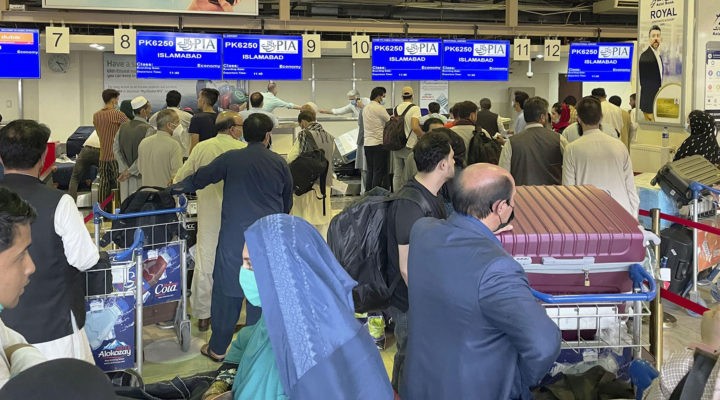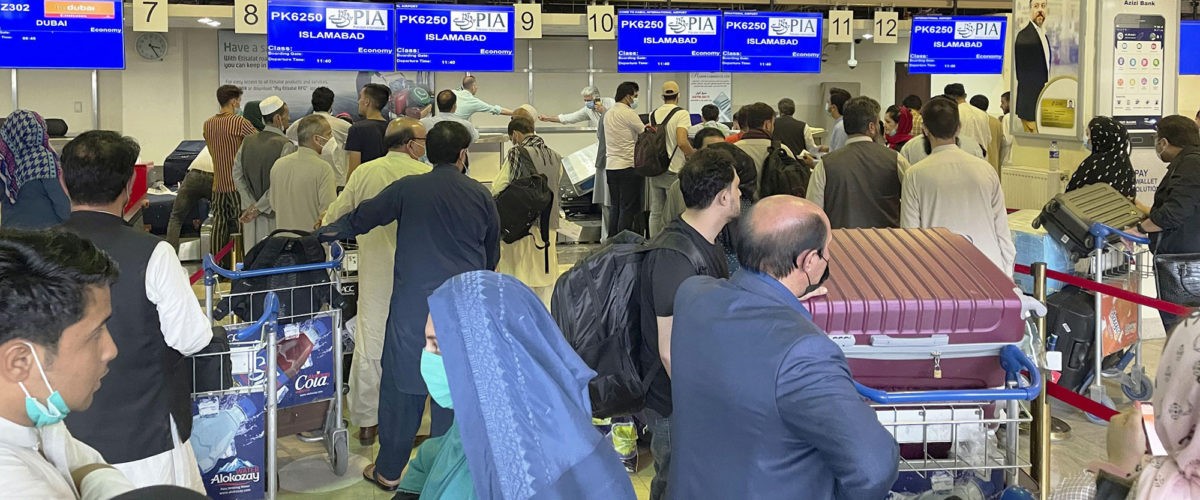“What we are witnessing, in real time, is a humanitarian catastrophe.”
That’s the grim assessment of the situation in Afghanistan this week by one of the foremost authorities on immigration work in the United States. Ali Noorani, president of the National Immigration Forum, writing in The Bulwark Aug. 16, sounded the alarm and called churches and political leaders across the world to prepare to help.
“In the face of this disaster, the international community must prepare for what will likely be a massive surge of Afghan refugees. First and foremost, avoid the mistakes of the Syrian refugee crisis of 2015. Do not allow authoritarians like Viktor Orbán — and their new allies, like Tucker Carlson — to weaponize the crisis,” he advised.
“Do not allow authoritarians like Viktor Orbán — and their new allies, like Tucker Carlson — to weaponize the crisis.”
“Spend the capital, financial and political, to ensure Afghan refugees are protected. Ensure the U.S. refugee resettlement ceiling, which the Biden administration will set soon for fiscal year 2022, is high enough to meet this demand. Get people to safety, process their applications in a timely manner, and work with nongovernmental organizations around the world to welcome these families.
Sen. Rand Paul blocked expedited visas
Noorani, like many other informed observers, sees plenty of places to lay the blame for the humanitarian crisis unfolding in Afghanistan as the Taliban has regained control of the nation and begun executing opponents and enforcing strict fundamentalist Islamic law.

Rand Paul (Stefani Reynolds/The New York Times via AP)
One of those to blame for not allowing the U.S. to do more to rescue Afghan nationals and their families who helped American troops over the past 20 years is Sen. Rand Paul, R.Ky.
“Congressional efforts to advance Afghan Special Immigrant Visa reforms were stalled” by the Kentucky senator, Noorani said. He quoted Paul as saying of his blockade: “I would encourage them rather to stay and fight. I think it would be good to have many English speakers in Afghanistan.”
Sen. Paul, who has a reputation for being one of the most contrarian senators in a chamber known for contrarians, used his single-member power to block unanimous consent in the Senate that would have expedited legislation to rescue American allies from Afghanistan.

Ali Noorani
“After weeks of haggling, Congress finally passed legislation to increase the number of Afghan Special Immigrant Visas, expedite the application process, and allocate over a billion dollars to fund Pentagon and State Department efforts,” Noorani wrote. “A few days later, as July came to an end, the first planeload of some 200 interpreters and their families arrived at Fort Lee, Va.”
And now, as Kabul has fallen and the Afghan president has fled the country, it is too late to evacuate all those who were eligible, Noorani said.
‘Lack of planning’
To put a face on this, Noorani told the story of two Afghan nationals who interpreted for the U.S. Army and applied for interpreter visas yet got stranded with no way out. A message from a mutual friend explained the likely outcome: “Family trapped in Kabul and evacuation is only realistic option. Father worked for us for 15 years and is on a hit list and will almost certainly face execution if we leave him. His oldest daughter was whipped by Taliban and thankfully escaped to America.”
Noorani, and others, also place blame on the Biden administration for underestimating the rapidity with which the Taliban could regain control of the country after U.S. troops left.
“What is astonishing is the utter lack of planning by the administration to develop and execute a plan to protect the tens of thousands of Afghan nationals who worked with our military and civilian efforts,” he wrote. “Men, women and children whose only crime was to help our troops will be killed as a result.”
Christians also at risk
Another group at imminent risk of execution or persecution by the Taliban is Christians living in Afghanistan.
How many people that includes is unknown. Estimates range from fewer than 2,000 to maybe more than 10,000 in a country of 38 million people. No Christian churches are allowed to meet in public, and all Afghan citizens are legally registered as Muslims.
There is one Catholic church in Afghanistan, located inside the Italian embassy in Kabul. A single Catholic relief agency, Caritas Italiana, has been present in Afghanistan since the 1990s. That agency currently is helping vulnerable minors, but it has had to suspend all activities.
Afghanistan is “very slightly less oppressive than in North Korea” for Christians.
Life was not easy for the minority Christians in Afghanistan even before this week’s tragic turn of events. Open Doors USA explained that Afghanistan is “very slightly less oppressive than in North Korea” for Christians, who cannot be publicly identified as such. The international ministry ranks Afghanistan No. 2 on its watch list of countries where it is “most difficult to follow Jesus.”
David Curry, CEO of Open Doors USA, hesitated even to speak to the current predicament: “The situation in Afghanistan is so volatile that we must exercise considerable caution in the press in order to protect brothers and sisters in that region.”
The return of the Taliban “has devastating implications not only for Afghanistan, but for a region already destabilized by radical Islamic extremists,” Curry said. “The best way to help is to pray urgently for the protection of Christians and other religious minorities in Afghanistan. They need a miracle.”
The arrival of Christianity in modern-day Afghanistan is believed to date to the second century and due to the influence of Thomas the apostle. Christianity grew in the region until later conquests by the Muslims and Mongols, culminating in a near annihilation of Christianity there in the 13th century.
Relief agencies ready
While Christian missionaries have not been permitted to work publicly in Afghanistan, the immigrant relief agencies most focused on leading persecuted people to safety are faith-based. Among those is World Relief, an evangelical Christian ministry.

Myal Greene
“We are devastated by what’s happening in Afghanistan and stand with the Afghan people,” said Myal Greene, president of World Relief. “We are acutely aware of the fears and anxiety that the Afghan people feel right now. World Relief is deeply concerned about the many Afghans, including those who assisted U.S. troops, human rights defenders, religious minorities and others, who will be left vulnerable as our troops withdraw. I am praying for peace and the protection of those in Afghanistan right now and ask that others join me in prayer as well.”
World Relief has been among the groups pressing the White House to act swiftly to keep the nation’s promise that Afghans who served alongside U.S. troops would be brought to safety in the United States.
A news release said World Relief “stands ready and eager to welcome evacuated Afghan refugees and is actively working with our local partners to prepare to welcome as many refugees as possible. The fiscal year 2022 refugee ceiling, which the Biden administration is due to set in the coming weeks, must account for a significant number of Afghan refugees.”
The New York Times reports that more than 15,000 Afghan nationals, plus family members, already have been resettled in the United States with special immigrant visas. That is from among a total of 34,500 authorized visas.
Status of Afghan refugees worldwide
There is an existing Afghani refugee community in the U.S. that dates to the 1930s, although the primary immigration wave dates to 1980, when the Soviet Union invaded Afghanistan. An estimated 45,000 to 75,000 Afghan refugees have settled in the U.S.
“They comprise the largest protracted refugee population in Asia, and the second largest refugee population in the world.”
The United Nations High Commission on Refugees reports that there are almost 2.5 million registered refugees from Afghanistan living today around the world. “They comprise the largest protracted refugee population in Asia, and the second largest refugee population in the world.”
Noorani, of the National Immigration Forum, reported there are 1.4 million Afghans living as registered refugees in Pakistan, with hundreds of thousands more living there as undocumented immigrants. “To the west, Iran, Turkey and, eventually, Europe will see increased numbers of Afghan refugees. Last year, advocates on the ground in Serbia told me they were already seeing an increased number of unaccompanied Afghan minors trying to find safety in Europe.”
How to pray
In this time when there seems little an average person can do to make a difference, Open Doors USA suggests five specific ways Christians around the world might pray for Afghanis:
- Pray for an end to the violence and for God to give wisdom to the leaders and all those involved in peace negotiations. “Pray no more civilians would be injured or killed from airstrikes or attacks from either Afghanistan’s government or Taliban forces.”
- Pray for the hungry. “Ask for God’s divine provision for those in the margins of the war — for the men, women and children whose stomachs are rumbling due to the drought and lack of access to food and other basic needs. Pray for the Lord’s miracles to be real in their lives and that he would provide them both physical and spiritual food to nourish their bodies and souls.”
- Pray for the sick. “Many people in Afghanistan are infected and dying from COVID-19, especially with the spread of the Delta variant and lack of access to health care. Pray for the Lord’s healing and restoration to be upon all those who are ill. Pray he would send more vaccines to the country and that the vaccine rollout would be successful even amidst the increasing violence.”
- Pray for the displaced. “Many families are in refugee camps, are fleeing their homes or are thinking about fleeing. Pray for the Lord to grant them his protection, wisdom, shelter and provision.”
- Pray for the believers. “There must be so much fear and trepidation among followers of Christ who are secretly living their faith within their homes in this country, especially with the news of a possible Taliban takeover. Pray for the Holy Spirit to strengthen these secret believers in their inner being. Pray the peace of God would rule in their hearts.”
Related articles:
Afghanistan: A tragic example of an unjust war | Analysis by Chris Conley
Blame me for the situation in Afghanistan | Opinion by Craig Nash


